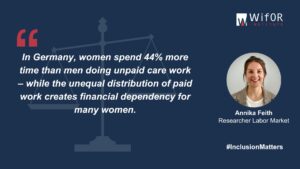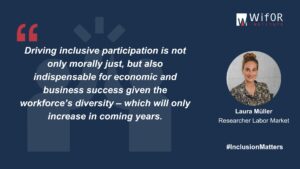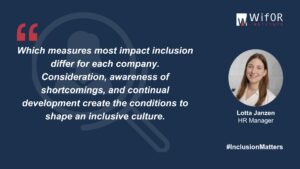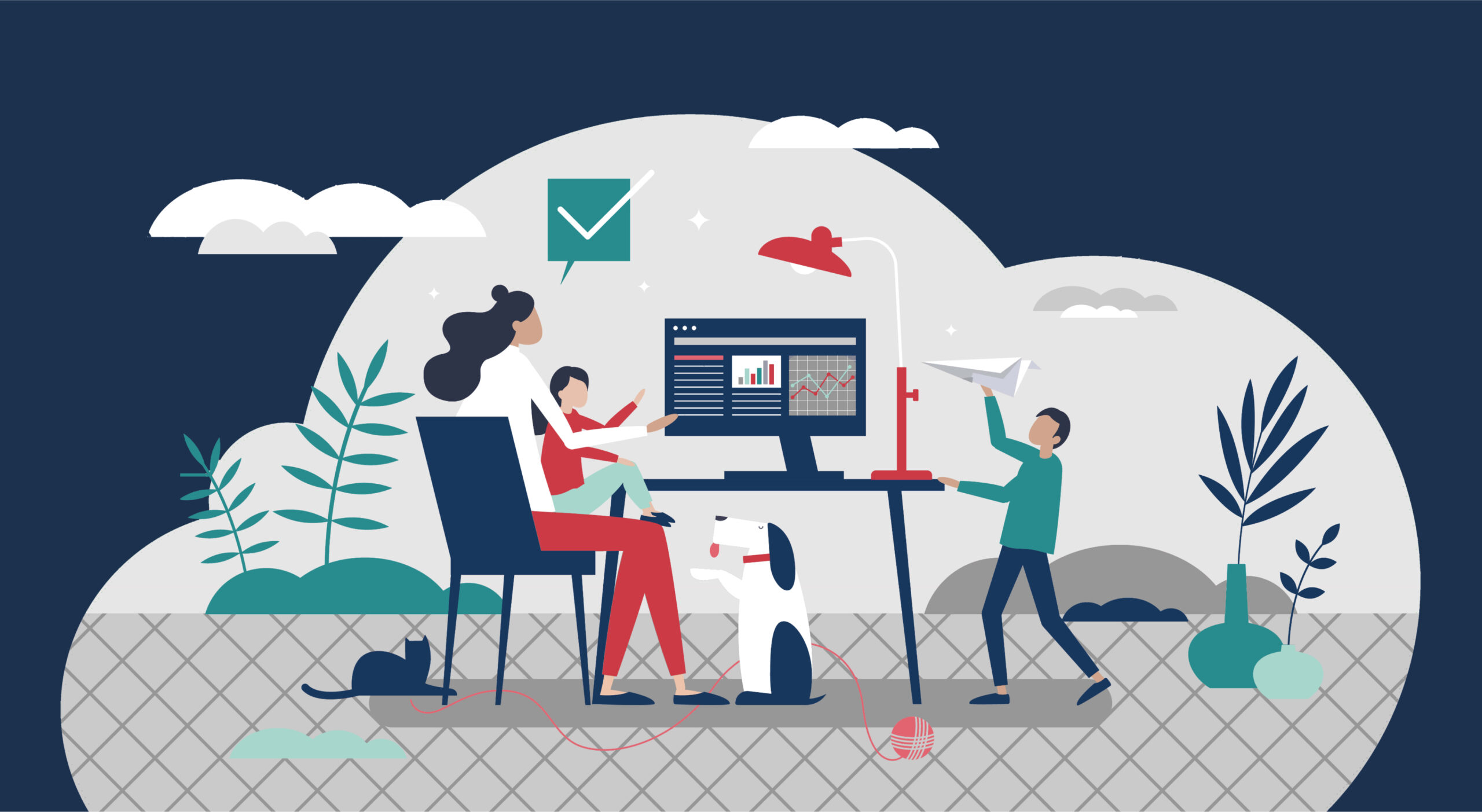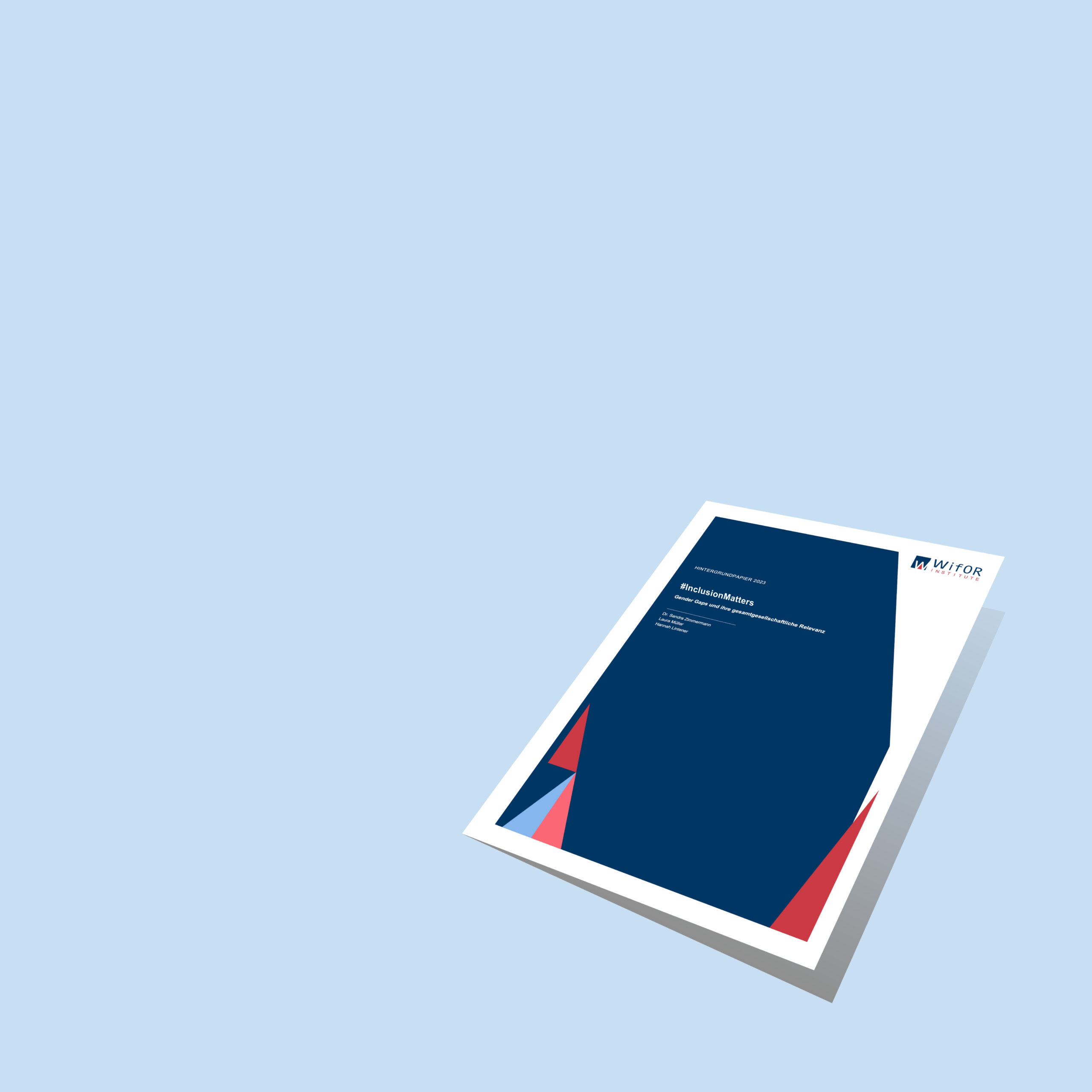With Equal Care Day, Equal Pay Day, and International Women’s Day, March is marked by days of action for greater gender equality. As current studies show, the topic is still highly relevant in 2024: Gender Gaps continue to drive structural inequality between men and women. The latest figures from Germany’s Federal Statistical Office show that women still earn significantly less per hour than men, with the Gender Pay Gap currently lying at 18% in Germany. Across the EU, the average Gender Pay Gap is just almost 13%. In both Germany and Europe as a whole, the Gender Pay Gap has hardly changed since 2006.
WifOR’s #InclusionMatters campaign aims to make existing gender gaps visible and contribute to a more inclusive society. Find out more about the scientific background of the campaign in this article.
The Pay Gap occurs after starting a family
The gross hourly wage of both genders is approximately the same between the ages of 15 and 25 – initially increasing at the same rate. However, women’s gross hourly wage stagnates from the age of 30, the average age of women at the birth of their first child. From the time of birth onwards, the gross hourly wages of women and men diverge considerably.
While half of fathers in Germany say they want to share childcare equally, only 21% actually do, according to the Federal Ministry of Family Affairs’ “Fathers’ Report” (2023). It remains mainly women who give up their jobs, reduce their paid working hours or accept lower salaries in exchange for childcare. The result is that women’s average gross hourly wage and absolute income are negatively affected.
Gender Gaps differ depending on industry, location, and demographics
The extent of gender inequality varies depending on sector, region, and additional demographic characteristics. For example, an investigation commissioned by ver.di shows that the Gender Pay Gap in the cultural sector averages at 24%, six percentage points higher than the national average. In fashion design, the Gender Pay Gap is almost at 50% – more than twice the national average. There are also initial indications that transgender people who have undergone gender reassignment face lower wages due to subsequent discrimination.
But it is not only the Gender Pay Gap that varies. The Gender Care Gap is the difference in unpaid care work that women perform compared to men. There are inequalities in the Gender Care Gap within Germany that vary, for example, by federal state. Measured by the proportion of fathers eligible for parental leave who take more than two months off from work, the Gender Care Gap is found to be particularly wide in Bavaria and Baden-Württemberg.
Gender Gaps: What consequences do they have for women?
Due to working fewer hours, women in Germany receive on average a pension approximately 30% smaller than men’s (“Gender Pension Gap”) – and are significantly more likely to be at risk of poverty in old-age. Women also earn significantly less than men over the entirety of their lives, resulting in a Gender Lifetime Earnings Gap. In Germany, women are estimated to earn just under 50% less what men do over their careers. However, if the hours from paid and unpaid labor are added together, women work on average more hours (57.7 vs. 52.7 hours per week).
As women still perform significantly more care work than men today, they disproportionately bear the mental load of organizing family life – a dimension of the unequal distribution of care work that cannot be expressed in terms of time or monetary units. However, lower pensions, a higher risk of poverty, and a greater mental load are not the only consequences of the unequal distribution of paid work.
Financial dependence fosters financial violence
Lower salaries alongside unpaid family and care work can also lead to situations of financial dependency. In Germany, almost one in three women say they are financially dependent. And 82% of these women also expect they will never become financially independent. Financial dependency within a relationship can make it difficult for women to confidently stand up for their needs or separate from their partner.
Economic dependence can even lead to financial violence, occuring when the financial dependency of one partner is exploited by the other. For example, if the person providing care in the relationship has significantly less money at their disposal than the person in paid employment, a discrepancy exists in their independent capabilities to spend. Another form of financial violence occurs when people who are obliged to pay maintenance threaten to reduce or completely stop paying maintenance for the children, thus putting the other person in a situation that threatens their existence.
How can financial equality between genders be achieved?
Due to the still prevalent one-earner model and the unequal division of paid work and care work, women are particularly likely to be affected by financial violence.
An important lever for achieving gender equality would be, for example, a more equal split of income within relationship. In addition, an adjustment to parental leave could also contribute to greater gender equality, as decisions regarding the division of paid work and care work are often made early on after the birth. Another example is for parental leave to be gradually adjusted so that the total amount is highest when both parents take seven months each.
In addition to policy measures, corporate changes are also important. Creating a corporate culture that encourages a fair division of care work is just as relevant for social change. A corporate culture can, for example, include greater acceptance of part-time, flexible working hours, and (more) home office options across all genders – including for those in leadership positions.
Workplace discrimination, consequences for those affected and the impact on society
Structural discrimination in the labor market is not only manifested in the Gender Pay Gap. It also occurs in the workplace, for example through less integration into informal networks or discriminatory treatment by management. The outcome can result in fewer career opportunities. Not only women, but also other social groups such as people with a migratory background, people with disabilities, and non-heterosexual people are affected by such discrimination in the workplace. This can significantly worsen the mental health of those affected.
Over the next three years, WifOR will analyze – on behalf of the Hans Böckler Foundation – the importance of an inclusive corporate culture. The study includes the perceptions of different social groups and examines the impact on mental health as well as for the economy. Based on a three-wave representative survey, WifOR will carry out a descriptive analysis, causal correlation analysis, and a calculation of the social impact.
